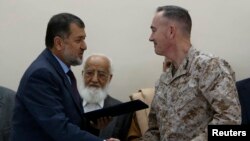ISLAMABAD —
The commander of NATO-led international forces in Afghanistan has made his first official visit to neighboring Pakistan, after assuming command earlier this year. His visit comes amid continuing recriminations between Afghan and Pakistani officials, undermining hopes that a recent thaw in ties could help bring Taliban insurgents to the negotiating table.
General Joseph Dunford, commander of the NATO-led international forces in Afghanistan, met Monday with military chief General Ashfaq Pervez Kayani in Rawalpindi, where the Pakistan army is headquartered.
A joint statement released after the meeting said the two leaders discussed ways to strengthen military cooperation and “pressuring militants who threaten security along the Pakistan-Afghanistan border.”
Officials in Pakistan allege that fugitive militants taking refuge in Afghanistan cross the border with the help of Afghan insurgents to attack Pakistani civilian and military targets. They also are critical of the Afghan National Army for not stopping the violence.
Former Pakistan military spokesman retired General Athar Abbas says such infiltrations and insurgent violence inside Afghanistan are likely to intensify if international forces withdraw from the country by the end of next year without having an effective peace plan in place. He cites the long, porous border.
"If it does not happen and the area is left without coming up with a formula, which basically puts a political dispensation, which is agreeable, approved or acceptable to main stakeholders in Afghanistan, I think then the turbulence or instability in Afghanistan is likely to spill over to Pakistan, and that is our main worry," said Abbas.
But Afghan officials have alleged that efforts aimed at political reconciliation with the Taliban are not progressing because Pakistan is not living up to its commitment to facilitate the peace process.
Golalai Noor Safi, a female Afghan lawmaker and member of the High Peace Council tasked with negotiating peace with the Taliban, also blames Pakistan for the recent tensions.
"We think that the Pakistani side is not honest in their relations and every day they change their mind about the [peace] process, about Afghanistan, about the situation," said Safi.
Hours after Monday's meeting between NATO and Pakistani top commanders, Afghanistan again accused Pakistan of continuing cross-border rocket and artillery attacks on Kunar, one of its eastern border provinces.
Last month, Afghanistan canceled a military trip to Pakistan over alleged cross-border shelling by Pakistani troops. Pakistan criticized the decision as an "overreaction."
Pakistan’s traditional links with some influential insurgent Afghan groups, including the Taliban, are seen as vital in international-backed efforts to try to bring an end to the violence in Afghanistan, to ensure an orderly withdrawal of foreign forces from the country.
Kabul alleges that Islamabad is not interested in promoting the Afghan peace process, a charge Islamabad denies.
General Joseph Dunford, commander of the NATO-led international forces in Afghanistan, met Monday with military chief General Ashfaq Pervez Kayani in Rawalpindi, where the Pakistan army is headquartered.
A joint statement released after the meeting said the two leaders discussed ways to strengthen military cooperation and “pressuring militants who threaten security along the Pakistan-Afghanistan border.”
Officials in Pakistan allege that fugitive militants taking refuge in Afghanistan cross the border with the help of Afghan insurgents to attack Pakistani civilian and military targets. They also are critical of the Afghan National Army for not stopping the violence.
Former Pakistan military spokesman retired General Athar Abbas says such infiltrations and insurgent violence inside Afghanistan are likely to intensify if international forces withdraw from the country by the end of next year without having an effective peace plan in place. He cites the long, porous border.
"If it does not happen and the area is left without coming up with a formula, which basically puts a political dispensation, which is agreeable, approved or acceptable to main stakeholders in Afghanistan, I think then the turbulence or instability in Afghanistan is likely to spill over to Pakistan, and that is our main worry," said Abbas.
But Afghan officials have alleged that efforts aimed at political reconciliation with the Taliban are not progressing because Pakistan is not living up to its commitment to facilitate the peace process.
Golalai Noor Safi, a female Afghan lawmaker and member of the High Peace Council tasked with negotiating peace with the Taliban, also blames Pakistan for the recent tensions.
"We think that the Pakistani side is not honest in their relations and every day they change their mind about the [peace] process, about Afghanistan, about the situation," said Safi.
Hours after Monday's meeting between NATO and Pakistani top commanders, Afghanistan again accused Pakistan of continuing cross-border rocket and artillery attacks on Kunar, one of its eastern border provinces.
Last month, Afghanistan canceled a military trip to Pakistan over alleged cross-border shelling by Pakistani troops. Pakistan criticized the decision as an "overreaction."
Pakistan’s traditional links with some influential insurgent Afghan groups, including the Taliban, are seen as vital in international-backed efforts to try to bring an end to the violence in Afghanistan, to ensure an orderly withdrawal of foreign forces from the country.
Kabul alleges that Islamabad is not interested in promoting the Afghan peace process, a charge Islamabad denies.




